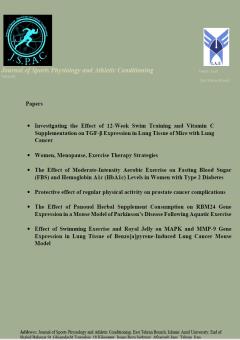-
-
-
Open Access Article
1 - The effect of caffeine consumption on some factors of physical fitness and skills of young footballers
pourya pazouki Abdolrasoul Daneshjoo -
Open Access Article
2 - Neuromuscular Electrical Stimulation in Muscular Adaptations in Exercise: A Narrative Review
Daniel Tarmast -
Open Access Article
3 - The Role of Conscious Control Propensity in Determining the Effects of Attentional Foci instructions
Mohammad Tollabi Elaheh Arab Ameri Mehdi Shahbazi Alireza Babaei Mazreno Fatemeh Sadat Tabatabaei -
Open Access Article
4 - Investigation of the Level of Consumption and the Effects of Sports Supplements on the Satisfaction and Performance Quality of Bodybuilding Athletes
Mohamad Ilanloo Alireza Eizadi Behzad Divkan -
Open Access Article
5 - A Theoretical Comparison Between Periodization and Non-Periodized Training: A Short Theory Review
Mohammad Bagher Afshar Naseri -
Open Access Article
6 - Indicators of Specific Performance Test in Judokas versus Wrestlers; A Comparative Study
Abbas Ghanbari-Niaki Seyed Ali Khazaei Nader Hamedchaman -
Open Access Article
7 - The Effect of Turmeric and Ginger Herbal Plants on Endurance Performance in Athletes: A Systematic Review
Zahra Morteza Pour Elham Farhadfar Zahra Sarlak
List of Articles Performance
-
The rights to this website are owned by the Raimag Press Management System.
Copyright © 2017-2026


